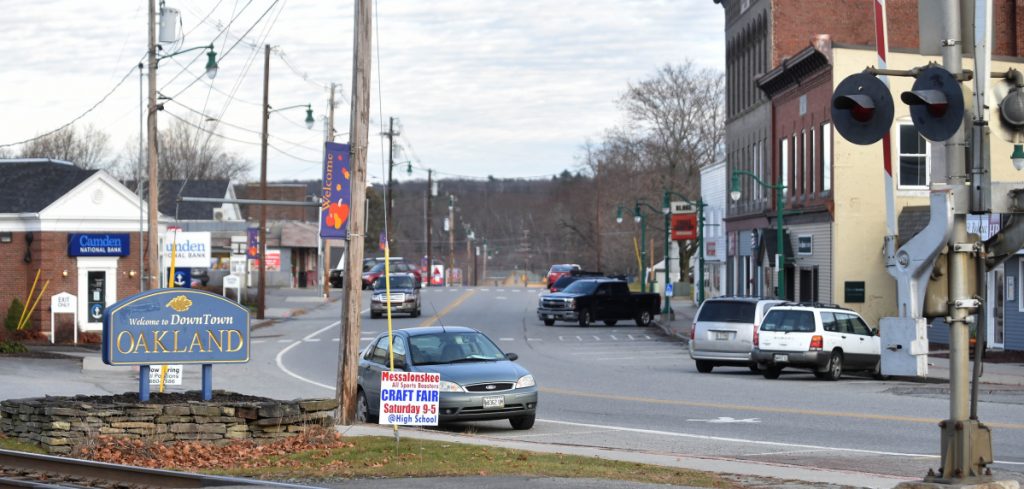OAKLAND — Amid efforts to spur economic development in downtown Oakland, the town recently received funding to look into improving its broadband internet service in the Main Street area.
While the $15,000 grant from the Maine Community Foundation does not cover the cost of building new infrastructure, it will allow town officials to map the existing broadband wiring, assess areas for improvement and provide an estimated cost of a full project, should the town choose to pursue one in the future. Eventually, this could lead to decreased internet bills and better service for residents and businesses alike.
“Broadly speaking, this puts us in a position to acquire other funding opportunities and to be prepared to put a capital plan together to grow infrastructure,” said Garvan Donegan, director of planning and economic development at the Central Maine Growth Council, which has been working with Oakland to develop a comprehensive plan for the town. “We believe we identified a gap in Main Street that could affect residents or businesses in proximity to downtown, but this could also be the beginning of looking at a larger broadband project that could see faster internet speeds and more options (of providers), thus potentially leading to more cost-effective internet access.”
Oakland Town Manager Gary Bowman said internet improvements near Main, Pleasant and Oak streets could help sustain and grow local businesses.
“We’re trying to improve downtown and the business climate down there,” Bowman said. “Broadband and fiber optic internet is extremely important for these businesses to keep up (and stay open). This is one more step in the right direction that Oakland is making to make the town more business-friendly and improve our downtown.”
Donegan agreed.
“On the supply side of economic development, we want to provide businesses and residents with adequate tools, or infrastructure,” he noted. “On the demand side, it creates a more competitive economic construct for recruitment or a more cost-competitive scenario for downtown internet (service providers).”
Donegan added that improving Oakland’s broadband infrastructure could have a ripple effect that could reach neighboring towns.
“There are spillover effects, ancillary benefits to this,” he said. “If a new business does happen to come in or an existing one retains a job or hires new people, then that is felt throughout the broader community and does not stop at municipal boundaries.”
Currently, Oakland is served by a “patchwork system of fiber, implemented through a 2007 federal grant” from the Department of Homeland Security, according to Donegan. The main beneficiaries of this system are municipal buildings on the outskirts of the downtown area.
“In Maine and in rural communities, the story of broadband is really the tale of two cities, in that there’ll be some fiber or some broadband in some of the core districts of the community, but once you get to peripheries of the community, it really falls off quite quickly.”
Expanding internet access in rural areas has been gaining steam across the state.
“As some are now saying, really every business in the future will be a technology or technology-oriented type business,” Donegan said. “It cannot be understated how critically important (internet access) is. Maine in general — beyond Oakland — and certainly rural Maine has some of the slowest connection speeds in the continental United States.”
Maggie Drummond-Bahl, senior program officer at the Maine Community Foundation, said that this trend played a role in the creation of the organization’s first-ever broadband grants.
“We started the community broadband program because it’s clear that access to high-speed internet is directly related to quality of life of Mainers,” she stated in an email. “With reliable, affordable high speed internet access businesses can grow and access new markets, and the greater connectivity helps people access services, education, and so many other resources. It’s critical that Maine keeps up with the rest of the world when it comes to being connected.”
Oakland is one of 11 municipalities or organizations throughout the state to have received the inaugural Maine Community Foundation Community Broadband Grant. In evaluating applications, Drummond-Bahl said, Oakland’s stood out for a number of reasons.
“We looked for applications that had both short and long term goals, and understood the value of high speed internet access not just for the technology itself but for the value to quality of life in the community,” she wrote. “We really looked for proposals that reflected the understanding that a critical part of this work is making sure that people and businesses don’t just gain access to the service, but also that they have the skills to use the internet for all the value it provides and that they can afford to access it.”
A Broadband and Technology Committee has been formed to manage the Oakland project going forward. Bowman and the Central Maine Growth Council’s planning staff will serve on the committee alongside Town Councilor Don Borman; Danielle Marquis, of Higgins and Bolduc; Alexandra Fabian, of Fabian Oil; and Joshua Zukerman, of Snow Pond Tech Group. The committee will begin meeting within the next two weeks, according to Donegan.
The other recipients of the Maine Community Foundation’s 2019 broadband grant include the towns of Boothbay, Brooksville, Deer Isle and Rockport; the city of Biddeford; 3 Bridged Islands Broadband Co.; Newport Public Library Association; Northern Forest Center; Opportunity Center of North Franklin County, Inc.; and Our Katahdin.
Meg Robbins — 861-9239
Twitter: @megrobbins
Send questions/comments to the editors.



Comments are no longer available on this story